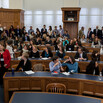Yale ISP Joins Fight Against Texas Clinic Shutdown Law
The Information Society Project at Yale Law School (ISP) joined with a collection of diverse and influential U.S. organizations and individuals to file an amicus brief urging the Supreme Court to reject Texas’ clinic shutdown law and once again affirm longstanding precedent by upholding a woman’s constitutional right to access safe and legal abortion services.
The ISP brief was one of 45 amicus curiae briefs filed on January 5, 2016 that reflect an extraordinary consensus among the nation's trusted medical experts, including the American Medical Association and the American College of Obstetricians and Gynecologists, as well as organizations representing pediatricians, nurses, family physicians, osteopaths, hospitalists and public health specialists. Together, the briefs discredit the health justifications Texas legislators relied on in passing HB2, a 2013 law many believe was designed to shutter abortion clinics with medically unnecessary red tape.
The collection of briefs filed include the largest coalition of faith leaders and faith organizations ever to oppose anti-choice laws at the high court, as well as a groundbreaking collection of individual stories that underline the importance of access to safe and legal abortion in women’s lives. Additional amici include the U.S. Solicitor General, state and federal legislators from both sides of the aisle, and hundreds of leading voices from fields as diverse as law, theology, entertainment, business and national defense.
Their briefs outline the substantial harm Texas women will face if the nation’s highest court affirms a June 2015 ruling from the U.S Court of Appeals for the Fifth Circuit that allowed the law’s most damaging provisions to take effect, and the threat that ruling poses to the separation of powers and the rule of law.
The law has already shuttered half of the abortion providers in Texas, and is poised to leave the nation’s second-largest state with 10 or fewer clinics, according to The Center for Reproductive Rights. After intervening twice to keep the Texas clinics open, the Supreme Court agreed in November to review the law, which opponents of the law believe are designed to shut down clinics that provide safe, legal abortion under the guise of improving women’s health.
Oral arguments have been scheduled for March 2, 2016.
The ISP brief specifically argues that in order to preserve the core protection for a woman's decision secured in Planned Parenthood v. Casey, and the balance Casey struck between the woman's "free choice" to have an abortion and the state's interest in promoting potential life over childbirth, courts must independently examine whether health-justified abortion restrictions actually further health-related ends and do not protect potential life by unconstitutional means. The brief concludes that the Fifth Circuit's decision mandating extreme judicial deference is inconsistent with the Supreme Court's decisions in Casey and in Gonzales v Carhart.
“For the foregoing reasons, the Fifth Circuit’s deferential rational basis test advocated below must be rejected and its decision overruled,” states the brief. “Protecting women’s dignity and maintaining the balance Casey struck requires an independent inquiry into whether and how effectively health-justified abortion regulations serve women’s health.”
Priscilla J. Smith, Director and Senior Fellow for the Program for the Study of Reproductive Justice at ISP, led the effort in filing the brief. ISP Visiting Fellow Hernandez Stroud, Yale Law Students Katie Haas '17 and Scout Katovich '17, and YLS graduate Courtney Dixon '15 all contributed to the brief.
"The ISP and its Program for the Study of Reproductive Justice are honored to be involved in this case, and to bring some of the important scholarship being done on this issue at Yale Law School, especially by Professors Reva Siegel and Linda Greenhouse, to the attention of the Court," said Smith. "We are hopeful that the Court will reject the State of Texas's attempt to do an end run around the limitations on government power to obstruct access to abortion without serving any valid state interest."
The ISP at Yale Law School is an intellectual center with a special expertise in the intersections between the regulation and dissemination of information, health policy, privacy concerns, First Amendment and reproductive rights jurisprudence, and technology policy. Many of the scholars associated with the ISP have special expertise in First, Fourth and Fourteenth Amendment jurisprudence and share an interest in ensuring that the constitutionality of abortion regulations is determined in accordance with settled Fourteenth Amendment principles.
For additional information on the case, view the full press release from The Center for Reproductive Rights.


